6 Benefits Of Sprouts For Weight Loss (With Recipes)
Satisfy your hunger pangs and shed those extra pounds with this nutritious snack!

Image: Shutterstock
Sprouts are plant-based protein sources that are also loaded with dietary fiber. That’s why sprouts are great for weight loss. They help improve satiety, keep you from binge eating, add to the daily protein requirement, and even boost your metabolism.
Preparing sprouts is simple. You just need to soak seeds overnight to promote the formation of a tail-like white growth (1). These germinated young plants have health-promoting effects. They are rich in calcium, vitamins, enzymesi Proteins that act as catalysts in the body and speed up chemical reactions such as digestion, respiration, and nerve function. , and various other minerals, along with protein and fiber (2).
Sivakami Muthiah, a blogger, shares the process of growing sprouts at home, highlighting the benefits of sprouts for health and growth. The post provides a step-by-step guide, encouraging readers to introduce sprouts, such as green gram, to their diet for a refreshing and nutritious experience. He states, “Sprouts mean something that is sprout-ING or grow-ING, and so are its benefits always multi-fold!” He also outlines a series of ways to eat them, although his preferred method is salads, “But, the best way to eat it is just as sprouts or in salads (without processing or cooking further) so as to benefit from all of it’s nutrients. It is high in fiber and very good for your health (i).”
Read on to know why sprouts are good for weight loss. Also discover a few delicious sprout recipes to snack on and curb your untimely hunger.
In This Article
Benefits Of Sprouts For Weight Loss
1. Loaded With Fiber
100 g of sprouts contains 1.8 g of fiber (2). A study conducted on two types of seeds (barley and canola) found that the sprouting process increases the fiber content more in barley than in canola seeds (3).
Fiber provides satiety (the feeling of fullness) and helps in reducing food intake. It also helps you lose weight by lowering your appetite (4).
2. Low In Calories
Sprouts are extremely low in calories. 100 g of sprouts contains just 30 kcal of energy (2).
A study conducted on overweight and obese premenopausal women concluded that a low calorie diet with a daily sweet snack leads to a reduction in body weight, hip circumference, waist circumference, and body fat percentage (5).
So, indulge in cooked or raw sprouts salad to curb your hunger pangs and fill up your stomach.
3. High In Protein
Raw and lightly cooked sprouted grains or legumes are a good source of plant-based protein.
Lentil sprouts
are an especially great source of protein. 100 g of lentil sprouts contains 9 g of protein (6).
The sprouting or germination process also increases the amino acid profile of grains, which is important for overall health improvement (7).
A study published in the European Journal of Obesity found that people on a high-protein diet lose more weight compared to people on a standard-protein diet (8).
Another study conducted on women who were overweight or obese states that peanut sprouts help reduce abdominal fat (waist circumference) and LDL cholesterol level (9).
4. Low In Fat
Eating sprouts salad for lunch is extremely beneficial in providing satiety and promoting weight loss.
Bean sprouts are low in fat (2). Snacks that are low in calories and fat and high in fiber have been found to reduce body weight (10).
5. May Improve Digestion
The sprouting process increases the soluble fiber content of grains threefold, which helps provide relief from constipation (11), (12).
Upon germination, sprouted seeds release proteases (protein-digesting enzymes) that aid the digestion of animal protein (13).
Another study conducted at the Poznań University of Life Sciences stated that the antioxidant property of broccoli sprouts improves gastrointestinal health (14).
When you have a strong digestive system, you are less likely to accumulate toxins in your body, which ultimately leads to weight loss.
6. Control Hunger Pangs
Including sprouts in your daily diet helps you control those dreaded hunger pangs and fills your stomach for longer.
A study conducted in the United States found that foods that are high in nutrients, especially fiber, fill up your stomach for longer and curb unnecessary food intake (15).
Therefore, it reduces hunger pangs and prevents binge eating. The equation is pretty simple – less binge eating equals less weight gain!
Now that you know all the ways that sprouts aid weight loss, let’s check how to add them to your daily diet.
Key Takeaways
- Sprouts are a low-calorie and high-fiber ingredient that promote bowel function and satiety while reducing hunger pangs considerably.
- The presence of antioxidants like lutein and zeaxanthin helps improve your vision.
- Mung bean and Brussel sprouts are types of sprouts you can include in your daily diet.
- You can add sprouts to your soups, salads, or pulao to help you on your weight loss journey.
How To Eat Sprouts For Weight Loss
Sprouts are an excellent low-calorie and high-protein snack for weight loss.
They can be eaten raw or cooked. You can add sprouts to your salads to enhance their nutritional value and fiber content.
Lentil sprouts can be cooked with masalas and vegetables as a side dish with your main meals. You can also snack on mixed sprouts to fill your stomach between meals. While you may consume sprouts anytime during the day, it’s best to consume them before dinner. Registered Dietitian Bill Bradley explains, “Sprouts are rich in fiber. They aid digestion and help prevent constipation. It’s good to consume sprouts before dinner because the high fiber content helps you feel full for longer and prevents you from overeating at night.”
Here are some more ways to have them:
- Add them to your oatmeal, omelets, or wraps for breakfast.
- Enjoy them as a snack with sprouted grain crackers or nut butter.
- Add sprouts to your stir-fries, soups, or Buddha bowls for dinner.
Remember to rinse sprouts thoroughly before using them and store them in the refrigerator to maintain freshness.
 Trivia
TriviaCheck out how to prepare sprouts at home in the next section.
How To Prepare Sprouts At Home
Making sprouts at home is quite simple and cost-effective. The entire procedure takes just 1-2 minutes.
Let’s begin the sprouting process:
- Wash your legumes or grains well and place them in a bowl.
- Fill the bowl with cold water until the grains/legumes are covered.
- Drain the water the next morning. Cover the mouth of the bowl with a cloth and secure it with a rubber band.
- In the evening, rinse and drain the grains/legumes again.
- Continue the process for another day.
- Finally, your sprouts are ready! They will now have white-colored tails at the end.
Growing your sprouts is a rewarding and easy way to enjoy fresh, nutritious produce at home. Here are some tips to simplify the process:
- Choose sproutable seeds and avoid overcrowding the sprouting container.
- Rinse the sprouts thoroughly and store them in a cool, dark place.
- Start small, use a sprouting jar or container, and be patient.
Confused about which grains or legumes to use for your sprouts? Check out the next section for some assistance!
Lists Of Sprouts For Weight Loss
There are a number of sprouts varieties that can be enjoyed as part of your weight loss journey. Let’s have a look at what kind of sprouts you can add to your diet regimen:
1. Mung Bean Sprouts
Mung bean or green sprouts are very popular in Asia. They contain 20- 24% highly digestible protein and are low in calories. They also contain insoluble fiber and bioactive compoundsi Compounds found in plants and animals that exhibit antioxidant properties and help reduce the risk of cardiovascular diseases. that are essential for weight loss (16), (17). NASM Fitness Nutrition Specialist and Precision Nutritionist Counselor Matthew Scarfo says, “Prioritizing foods that are high in water, fiber, and protein is usually the best bet. For those who love sprouts, this is ideal. Mung bean sprouts are high in vitamins, fiber, and water, meaning you can feel full with relatively low calories.”
2. Brussels Sprouts
Brussels sprouts are high in nutrients that are good for your health. They are loaded with protein and fiber and are low in calories (18). The fiber content of these sprouts helps provide satiety and curb binging (4).
 Quick Tip
Quick Tip3. Alfalfa Sprouts
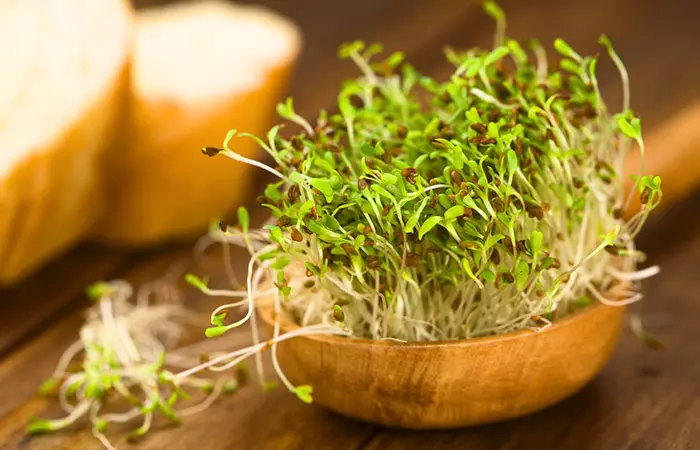
There are no sprouts that can beat the nutritional value of alfalfa sprouts in terms of weight loss. 100 g of these sprouts contains calories 23 calories, 4 g of protein, and 2 g of fiber (19). The nutty flavor of these sprouts makes them perfect for eating along with roasted seeds or as a filling in a healthy sandwich for weight loss.
4. Lentil Sprouts
Lentil sprouts are a powerhouse of macro and micronutrients. They are loaded with high-quality protein and digestible fiber that provide satiety and promote weight loss (6). Cook these sprouts to make a curry or prepare a delicious snack.
Here are a few recipes that you can add to your diet on your weight loss journey.
Sprouts Recipes For Weight Loss
1. Sprouts Salad
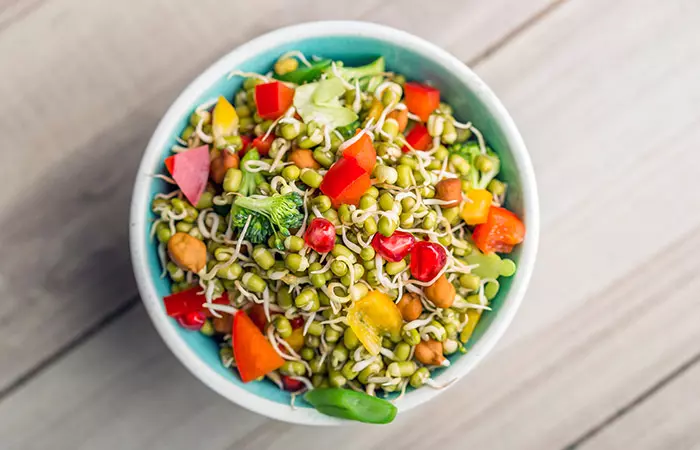
Preparation Time: 20 min, Cooking Time: 5 min, Total Time: 25 min, Serves: 2
Ingredients
- 2 cups sprouted moong beans
- 1 medium onion, finely chopped
- 1 medium tomato, finely chopped
- 1 green chili, slitted
- ¼ teaspoon red chili powder
- ½ teaspoon chaat masala (optional)
- 1 teaspoon lemon juice
- 1 boiled potato, chopped (optional)
- Rock salt to taste
- Coriander leaves and lemon slices for garnishing
How To Prepare
- Sprout the moong beans overnight.
- Wash the sprouts properly and boil them with a bit of salt. You can also use raw sprouts to make this salad.
- Add all the vegetables, red chili powder, and chaat masala to a bowl. Mix them well. You can add more vegetables to make the salad more nutritious.
- Add the boiled or raw sprouts, lemon juice, and some rock salt. Mix well.
- Garnish with coriander leaves and lemon slices.
2. Stir Fry Beans Sprouts
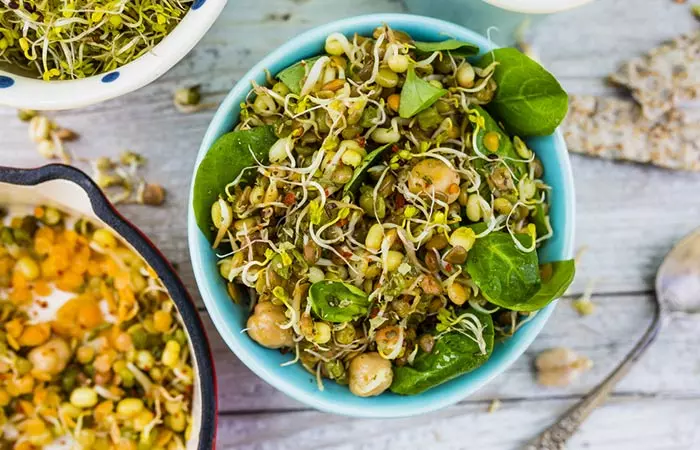
Preparation Time: 15 min, Cooking Time: 5 min, Total Time: 20 min, Serves: 2
Ingredients
- 1 cup sprouted moong beans
- 1 tablespoon soy sauce
- ½ tablespoon sugar
- 1 tablespoon vegetable oil
- Salt to taste
- Few drops of sesame oil
How To Prepare
- Sprout and wash the moong beans thoroughly.
- Heat vegetable oil in a wok and stir fry the sprouts.
- Add the soy sauce, sugar, and salt. Give it a nice stir.
- Drizzle some sesame oil and serve hot.
- You can add any greens you want to this salad to enhance its nutritional quality.
3. Sprouts Soup
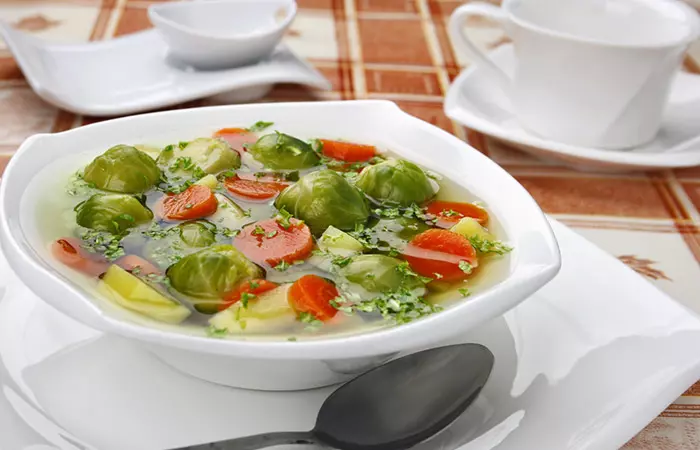
Preparation Time: 20 min, Cooking Time: 10 min, Total Time: 30 min, Serves: 1
Ingredients
- ½ cup mixed sprouts
- 1 potato, boiled, peeled and crushed
- 1 onion, grated
- 1 tablespoon cabbage finely chopped
- 1 tablespoon carrot, shredded
- 1 garlic pod, crushed
- ½ teaspoon sugar
- ½ teaspoon oil
- 1½ teaspoon cornflour
- 2 tablespoon chili sauce
- Salt to taste
- Water as required
How To Prepare
- Wash the sprouts thoroughly and boil them in 4 cups of water. Do not throw away the water.
- Mix the cornflour in some lukewarm water to make a batter.
- Add oil in a saucepan and sauté the chopped onion and garlic till a nice aroma is released.
- Add the boiled sprouts, chopped carrot, cabbage, and other vegetables of your choice. Sauté them with a little salt.
- Add the sprouts stock, chili sauce, and sugar. Bring the soup to a boil.
- Serve hot.
4. Low-Calorie Sprouts Pulao
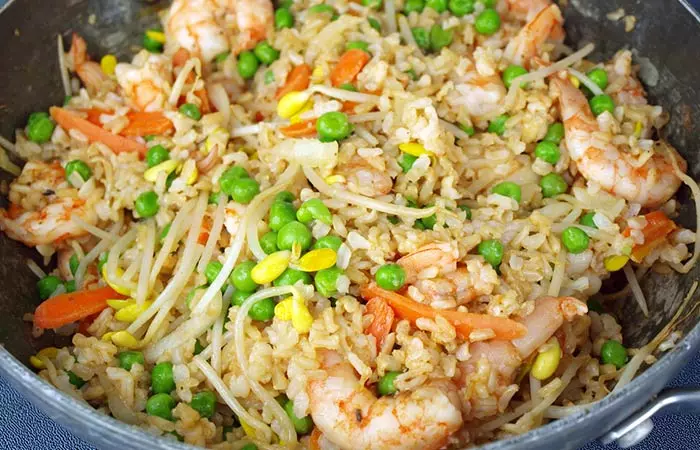
Preparation Time: 20 min, Cooking Time: 20 min, Total Time: 40 min, Serves: 2
Ingredients
- ½ cup matki sprouts
- ½ cup moong sprouts, boiled
- 2 cup brown rice, cooked
- 1 teaspoon oil
- 1 teaspoon cumin (jeera) seeds
- ½ cup onion, finely chopped
- 1 teaspoon garlic, finely chopped
- 1 teaspoon ginger, finely chopped
- A pinch of turmeric
- ½ teaspoon chili powder
- ¼ cup tomato, finely chopped
- 3 tablespoons capsicum, finely chopped
- 1 teaspoon pav bhaji masala
- Salt to taste
How To Prepare
- Heat oil in a non-stick frying pan and add the cumin seeds. Let it crackle.
- Add the chopped onion and sauté it till it becomes translucent.
- Add the crushed ginger, garlic, turmeric powder, chili powder, and tomatoes along with a little water. Let them cook for 2-3 minutes.
- Add the capsicum and a little more water. Cook for another 1-2 minutes and stir occasionally.
- Add the pav bhaji masala, matki sprouts, and boiled moong sprouts. Mix well and cook for 3 minutes with occasional stirring.
- Add the cooked brown rice and stir well. If needed, sprinkle some water for more cooking.
- Serve hot.
Besides weight loss, sprouts have a wide range of health and wellness benefits. Check them out below.
Other Health Benefits Of Sprouts
- Sprouts may help control blood sugar levels, which could help in the improvement of insulin resistance and type 2 diabetes (20).
- Spouts are heart-healthy snacks. Chickpea sprouts have antihyperlipidaemic (decrease cholesterol, triglyceridesi The fats that circulate in the bloodstream, they are the stored calories that provide energy to the body. , and low-density lipoprotein levels) effects (21).
- The vitamin C in sprouts boosts immunity (22).
- Brussels sprouts are a good source of lutein and zeaxanthin. These two antioxidants boost your vision (23), (24).
- Brussels sprouts are also rich in iron and vitamin C. These micronutrients help prevent anemiai A condition that leads to a lack of red blood cells in the body, resulting in weakness, dizziness, and headaches. (25).
- The sulforaphane in Brussels sprouts prevents premature aging (26).
Infographic: Sprouts For Weight Loss: 4 Reasons To Try Them
Sprouts are a nutritious ingredient frequently used in salads and stews. Sprouts have many health benefits, but they are especially effective if you are watching your weight. Check out the infographic below to learn more about the health benefits of adding sprouts to your diet and how they can boost your weight loss journey.

Illustration: StyleCraze Design Team
Sprouts are packed with fiber and proteins and are low in calories and fat. Adding them to your meal plan may improve digestion and curb those pesky hunger pangs that make you eat so much food. You can eat sprouts cooked or raw, on their own or mixed with other foods in a salad or other recipes. Alfalfa, mung bean, lentil, and brussels are the four types of sprouts you can add to your diet. Scroll up to take another peek at recipes that incorporate sprouts for weight loss. Consult a nutritionist or dietician to see how you can add sprouts to your daily meal plans in a healthy way. Also, to lose weight, stay active, and exercise daily.
Frequently Asked Questions
Can you lose weight eating Brussels sprouts?
Yes, eating Brussels sprouts in a salad or chaat helps you lose weight. They are loaded with fiber and low in calories, which helps provide satiety and cut down on binging.
Do sprouts cause weight gain?
No, sprouts do not cause weight gain. If you feel bloated after eating raw sprouts, it is only temporary weight gain. Boil sprouts to avoid this situation.
What happens if you eat sprouts daily?
Eating sprouts daily will not cause any discomfort. If you eat sprouts daily, it is better to boil them to avoid bloating.
Do sprout cause gas?
Eating raw sprouts daily and not drinking enough water may cause gas. Boil the sprouts to avoid this situation.
Are broccoli or Brussels sprouts better for you?
Both these vegetables belong to the cruciferous family and have a similar nutritive value. So, you can include them both in your diet.
Should we eat sprouts raw or boiled?
Sprouts can be taken in both forms. But, it is better to eat boiled sprouts to avoid bloating or gas.
Does sprouting reduce the protein content?
The sprouting process makes all the nutrients bioavailable to the body. It does not reduce the protein content.
Are homegrown sprouts safe to eat?
Yes, they are absolutely safe to eat.
Do sprouts reduce belly fat?
Sprouts can help improve digestion and reduce hunger pangs. Therefore, it can be a good snack to include in your diet while trying to reduce belly fat. Consuming sprouts along with proper exercise can help you burn belly fat more effectively.
Is it good to eat sprouts in the morning?
Yes, eating sprouts is considered a healthy breakfast option.
Illustration: Effective Benefits Of Sprouts For Weight Loss (With Recipes)
_illustration.jpg.webp)
Image: Stable Diffusion/StyleCraze Design Team
References
Articles on StyleCraze are backed by verified information from peer-reviewed and academic research papers, reputed organizations, research institutions, and medical associations to ensure accuracy and relevance. Read our editorial policy to learn more.
- Benincasa, Paolo, et al. “Sprouted grains: A comprehensive review.” Nutrients 11.2 (2019): 421.
https://www.ncbi.nlm.nih.gov/pmc/articles/PMC6413227/ - US Department of Agriculture, Agricultural Research Service. “Nutritive value of Brussels sprouts, raw.”
https://fdc.nal.usda.gov/fdc-app.html#/food-details/787771/nutrients - Chung, T. Y., E. N. Nwokolo, and J. S. Sim. “Compositional and digestibility changes in sprouted barley and canola seeds.” Plant Foods for Human Nutrition 39.3 (1989): 267-278.
https://pubmed.ncbi.nlm.nih.gov/2608636// - Clark, Michelle J., and Joanne L. Slavin. “The effect of fiber on satiety and food intake: a systematic review.” Journal of the American College of Nutrition 32.3 (2013): 200-211.
https://pubmed.ncbi.nlm.nih.gov/23885994// - Piehowski, Kathryn E., et al. “A reduced-calorie dietary pattern including a daily sweet snack promotes body weight reduction and body composition improvements in premenopausal women who are overweight and obese: a pilot study.” Journal of the American Dietetic Association 111.8 (2011): 1198-1203.
https://www.ncbi.nlm.nih.gov/pmc/articles/PMC3175790/ - US Department of Agriculture, Agricultural Research Service. “Nutritive value of Lentils, sprouted, raw.”
https://fdc.nal.usda.gov/fdc-app.html#/food-details/168427/nutrients - Sibian, Mandeep S., Dharmesh C. Saxena, and Charanjit S. Riar. “Effect of germination on chemical, functional and nutritional characteristics of wheat, brown rice and triticale: a comparative study.” Journal of the Science of Food and Agriculture 97.13 (2017): 4643-4651.
https://pubmed.ncbi.nlm.nih.gov/28370158// - Campos-Nonato, Ismael, Lucia Hernandez, and Simon Barquera. “Effect of a high-protein diet versus standard-protein diet on weight loss and biomarkers of metabolic syndrome: a randomized clinical trial.” Obesity facts 10.3 (2017): 238-251.
https://www.ncbi.nlm.nih.gov/pmc/articles/PMC5644969/ - Ha, Ae Wha, et al. “The supplementation effects of peanut sprout on reduction of abdominal fat and health indices in overweight and obese women.” Nutrition Research and Practice 9.3 (2015): 249-255.
https://www.ncbi.nlm.nih.gov/pmc/articles/PMC4460056/ - Kong, Angela, et al. “Associations between snacking and weight loss and nutrient intake among postmenopausal overweight to obese women in a dietary weight-loss intervention.” Journal of the American Dietetic Association 111.12 (2011): 1898-1903.
https://www.ncbi.nlm.nih.gov/pmc/articles/PMC3242470/ - Koehler, Peter, et al. “Changes of folates, dietary fiber, and proteins in wheat as affected by germination.” Journal of Agricultural and Food Chemistry 55.12 (2007): 4678-4683.
https://pubmed.ncbi.nlm.nih.gov/17497874/ - Yang, Jing, et al. “Effect of dietary fiber on constipation: a meta analysis.” World journal of gastroenterology: WJG 18.48 (2012): 7378.
https://www.ncbi.nlm.nih.gov/pmc/articles/PMC3544045/ - Rawski, Rafał I., et al. “The evidence of proteases in sprouted seeds and their application for animal protein digestion.” Chemical Papers 72.5 (2018): 1213-1221.
https://www.ncbi.nlm.nih.gov/pmc/articles/PMC5908832/ - Rychlik, Joanna, et al. “Antioxidant capacity of broccoli sprouts subjected to gastrointestinal digestion.” Journal of the Science of Food and Agriculture 95.9 (2015): 1892-1902.
https://pubmed.ncbi.nlm.nih.gov/25186016/ - Fuhrman, Joel, et al. “Changing perceptions of hunger on a high nutrient density diet.” Nutrition journal 9.1 (2010): 51.
https://www.ncbi.nlm.nih.gov/pmc/articles/PMC2988700/ - Tang, Dongyan, et al. “A review of phytochemistry, metabolite changes, and medicinal uses of the common food mung bean and its sprouts (Vigna radiata).” Chemistry Central Journal 8.1 (2014): 4.
https://www.ncbi.nlm.nih.gov/pmc/articles/PMC3899625/ - Hou, Dianzhi, et al. “Mung bean (Vigna radiata L.): Bioactive polyphenols, polysaccharides, peptides, and health benefits.” Nutrients 11.6 (2019): 1238.
https://www.ncbi.nlm.nih.gov/pmc/articles/PMC6627095/ - US Department of Agriculture, Agricultural Research Service. “Nutritive value of Brussels sprouts, raw.”
https://fdc.nal.usda.gov/fdc-app.html#/food-details/170383/nutrients - US Department of Agriculture, Agricultural Research Service. “Nutritive value of Alfalfa seeds, sprouted, raw.”
https://fdc.nal.usda.gov/fdc-app.html#/food-details/168384/nutrients - Bahadoran, Zahra et al. “Effect of broccoli sprouts on insulin resistance in type 2 diabetic patients: a randomized double-blind clinical trial.” International journal of food sciences and nutrition vol. 63,7 (2012): 767-71.
https://pubmed.ncbi.nlm.nih.gov/22537070/ - Harini, Sagili et al. “Antihyperlipidemic activity of chickpea sprouts supplementation in ovariectomy-induced dyslipidemia in rats.” Journal of Ayurveda and integrative medicine vol. 6,2 (2015): 104-10.
https://www.ncbi.nlm.nih.gov/pmc/articles/PMC4484045/ - Chambial, Shailja et al. “Vitamin C in disease prevention and cure: an overview.” Indian journal of clinical biochemistry : IJCB vol. 28,4 (2013): 314-28.
https://www.ncbi.nlm.nih.gov/pmc/articles/PMC3783921/ - Rasmussen, Helen M, and Elizabeth J Johnson. “Nutrients for the aging eye.” Clinical interventions in aging vol. 8 (2013): 741-8.
https://www.ncbi.nlm.nih.gov/pmc/articles/PMC3693724/ - Eisenhauer, Bronwyn et al. “Lutein and Zeaxanthin-Food Sources, Bioavailability and Dietary Variety in Age-Related Macular Degeneration Protection.” Nutrients vol. 9,2 120. 9 Feb. 2017.
https://www.ncbi.nlm.nih.gov/pmc/articles/PMC5331551/ - Canadian Paediatric Society. “Iron needs of babies and children.” Paediatrics & child health vol. 12,4 (2007): 333-6.
https://www.ncbi.nlm.nih.gov/pmc/articles/PMC2528681/ - Santín-Márquez, Roberto et al. “Sulforaphane – role in aging and neurodegeneration.” GeroScience vol. 41,5 (2019): 655-670.
https://www.ncbi.nlm.nih.gov/pmc/articles/PMC6885086/
Read full bio of Karishma Shah
- Bill Bradlet, RD, is a registered dietitian who has led over 1600 workshops and authored two books. He has over half a decade of experience and specializes in the Mediterranean diet and lifestyle. He is an alumnus of the University of Massachusetts Amherst.
 Bill Bradlet, RD, is a registered dietitian who has led over 1600 workshops and authored two books. He has over half a decade of experience and specializes in the Mediterranean diet and lifestyle. He is an alumnus of the University of Massachusetts Amherst.
Bill Bradlet, RD, is a registered dietitian who has led over 1600 workshops and authored two books. He has over half a decade of experience and specializes in the Mediterranean diet and lifestyle. He is an alumnus of the University of Massachusetts Amherst. - Matthew Scarfo is an NASM certified Fitness Nutrition Specialist and Precision Nutritionist Counselor with 19 years of experience. He is an endurance athlete, ultra runner, optimist, and infinite thinker who aims to contribute as much as he can to enrich his clients' lives.
 Matthew Scarfo is an NASM certified Fitness Nutrition Specialist and Precision Nutritionist Counselor with 19 years of experience. He is an endurance athlete, ultra runner, optimist, and infinite thinker who aims to contribute as much as he can to enrich his clients' lives.
Matthew Scarfo is an NASM certified Fitness Nutrition Specialist and Precision Nutritionist Counselor with 19 years of experience. He is an endurance athlete, ultra runner, optimist, and infinite thinker who aims to contribute as much as he can to enrich his clients' lives.
Read full bio of Priyanka Sadhukhan
Read full bio of Arshiya Syeda
Read full bio of Aparna Mallampalli







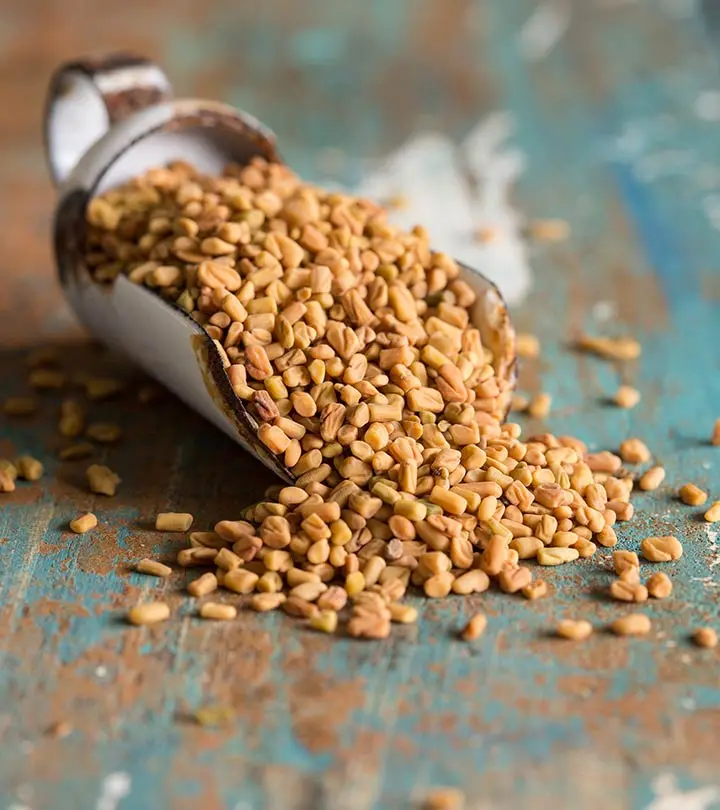

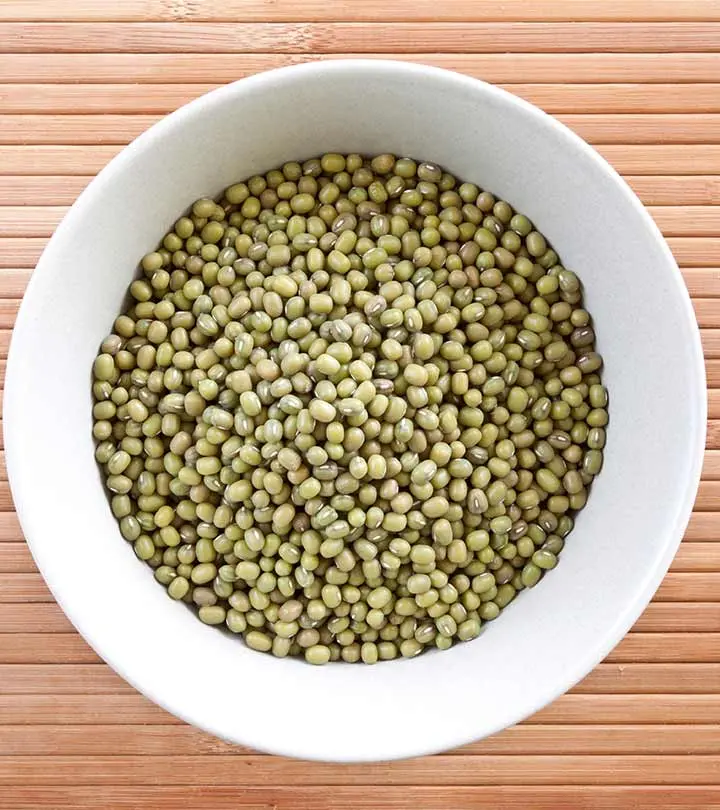
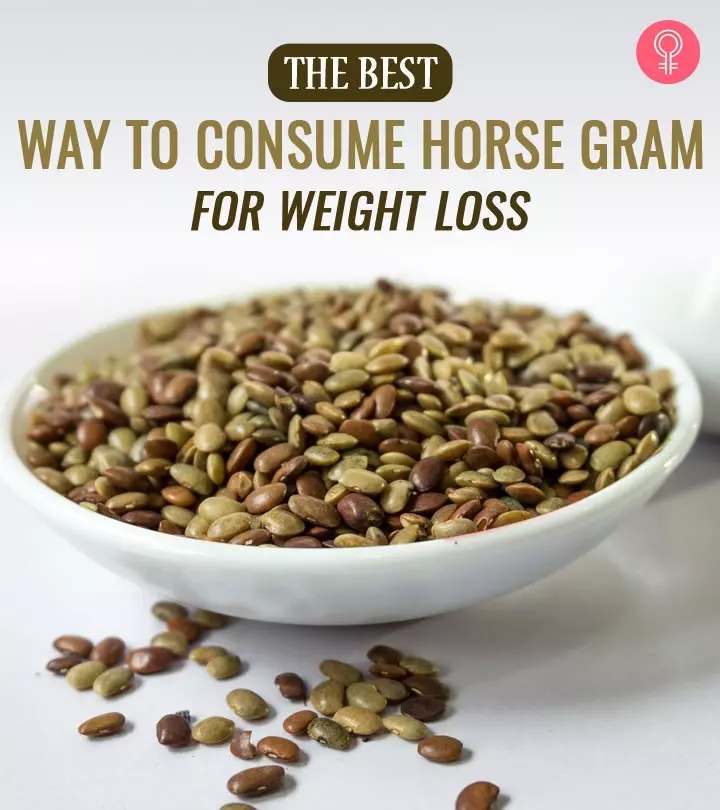
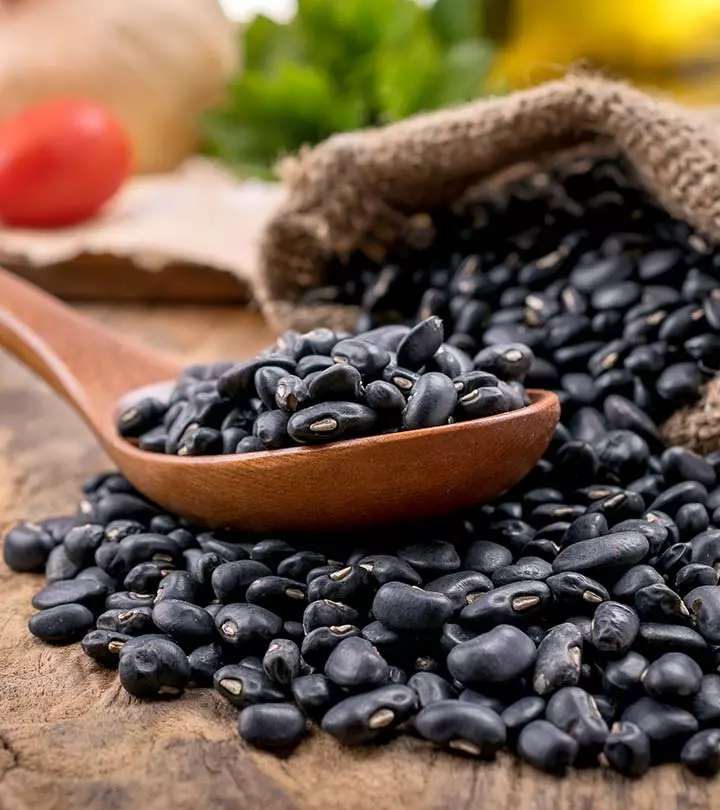
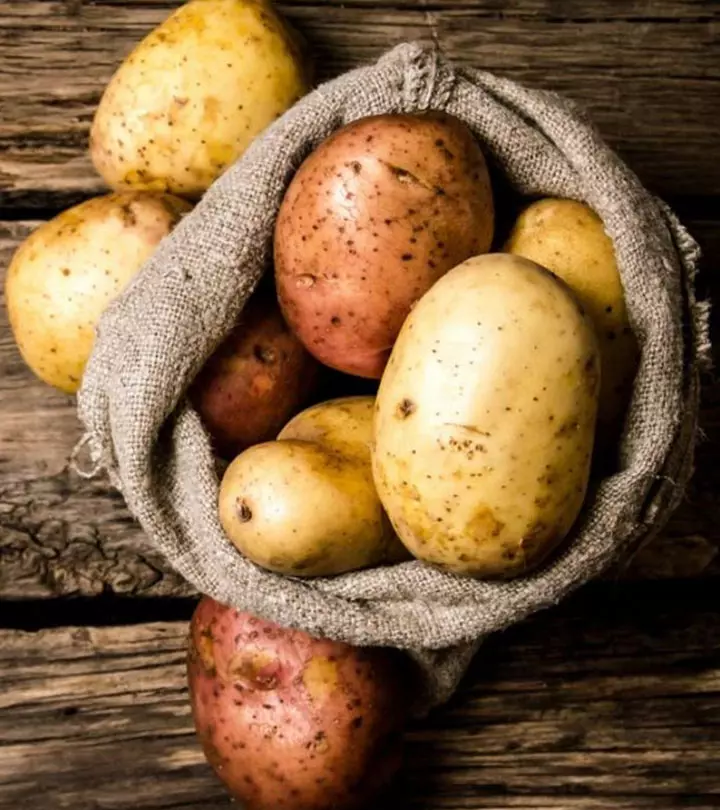
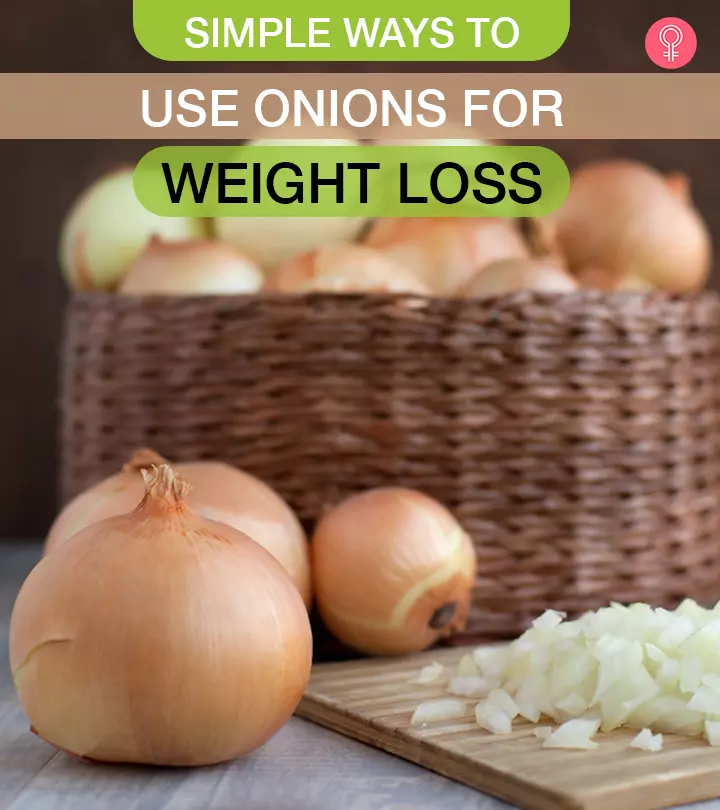

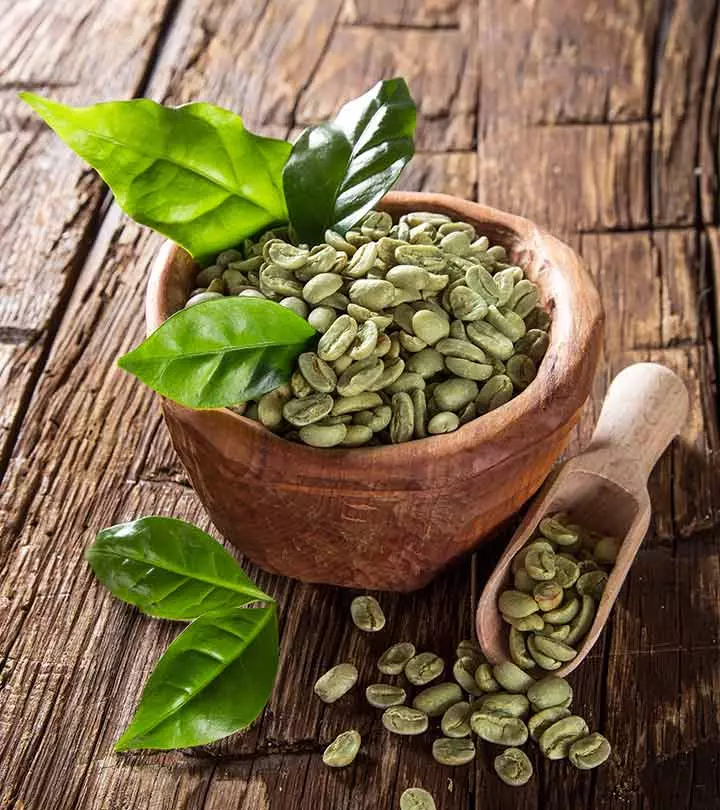
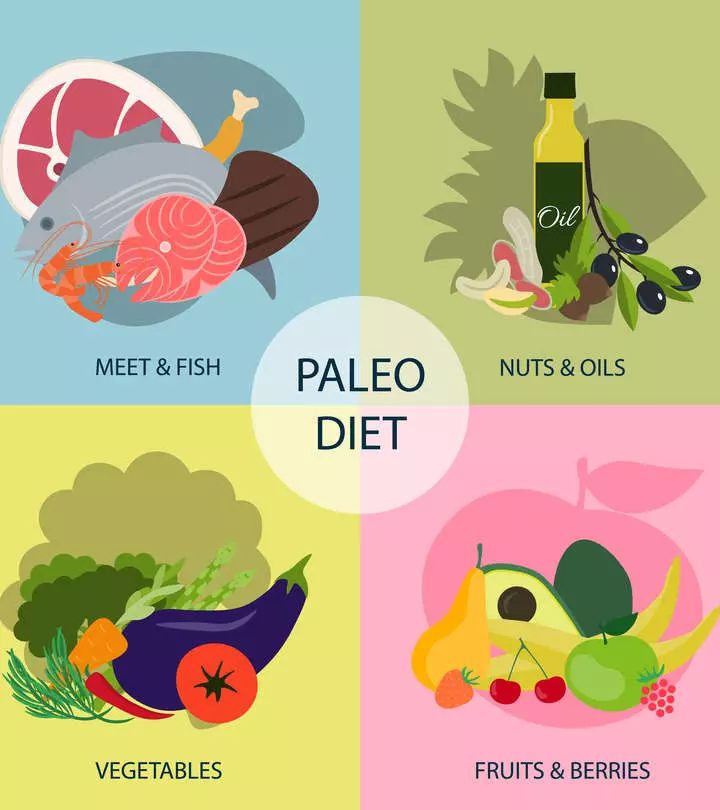
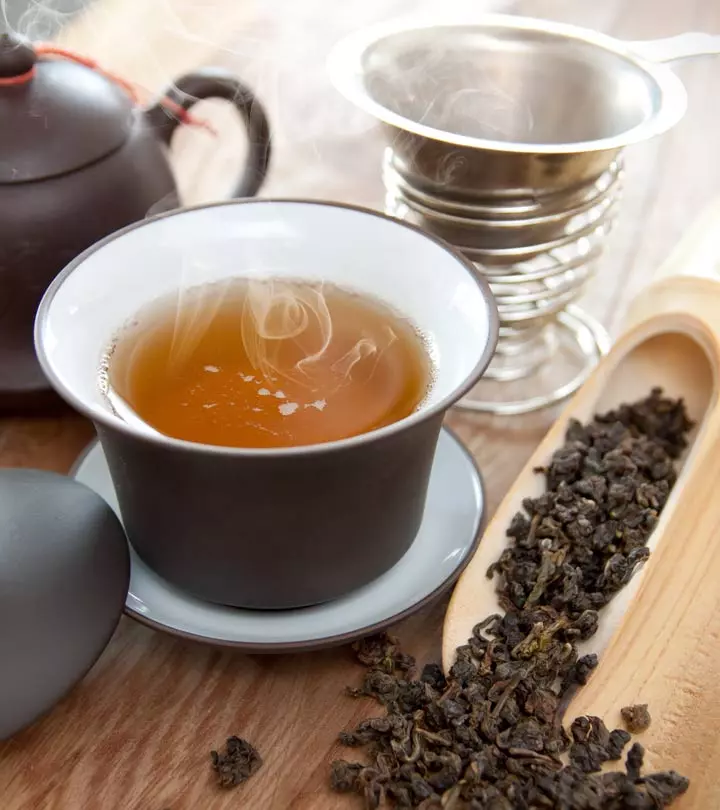
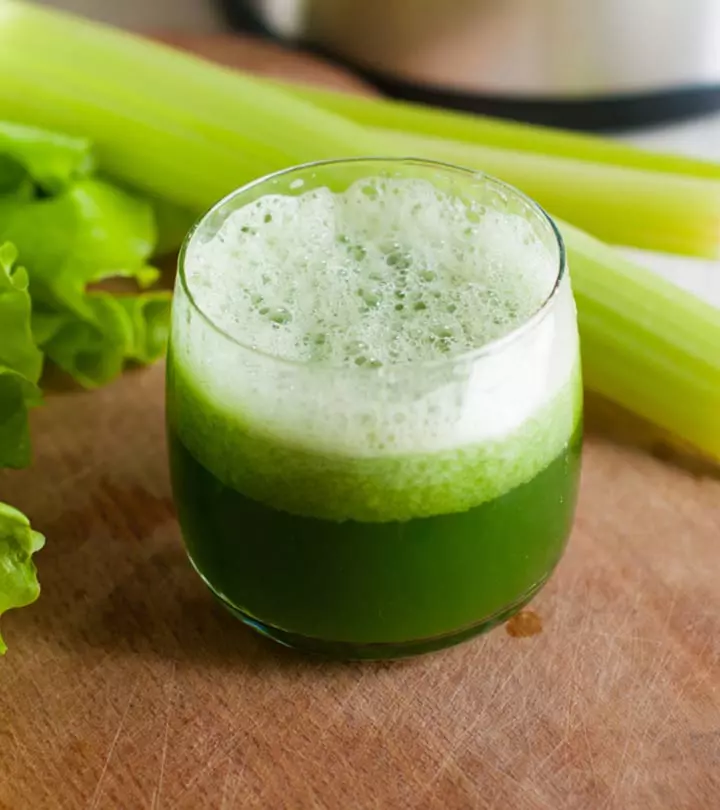
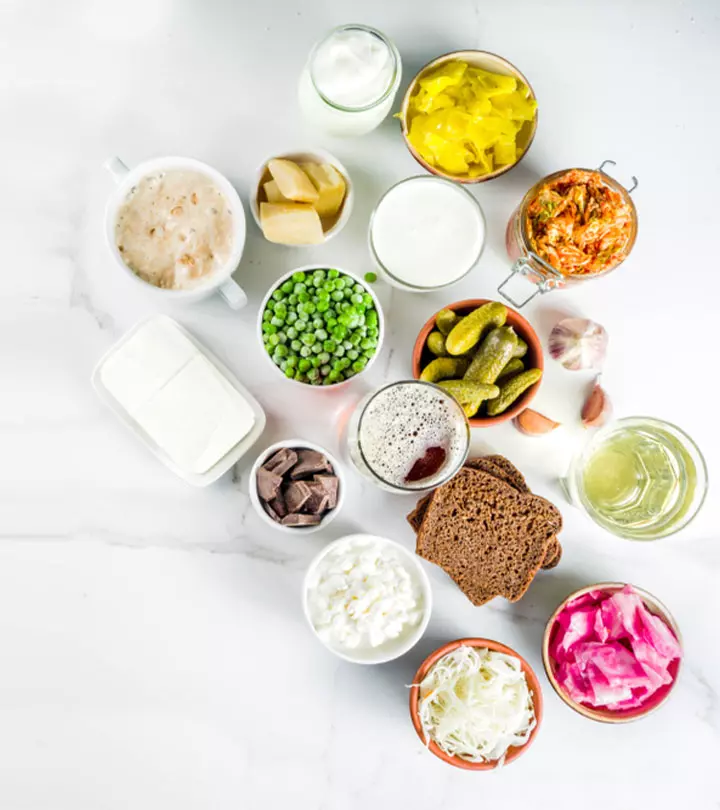



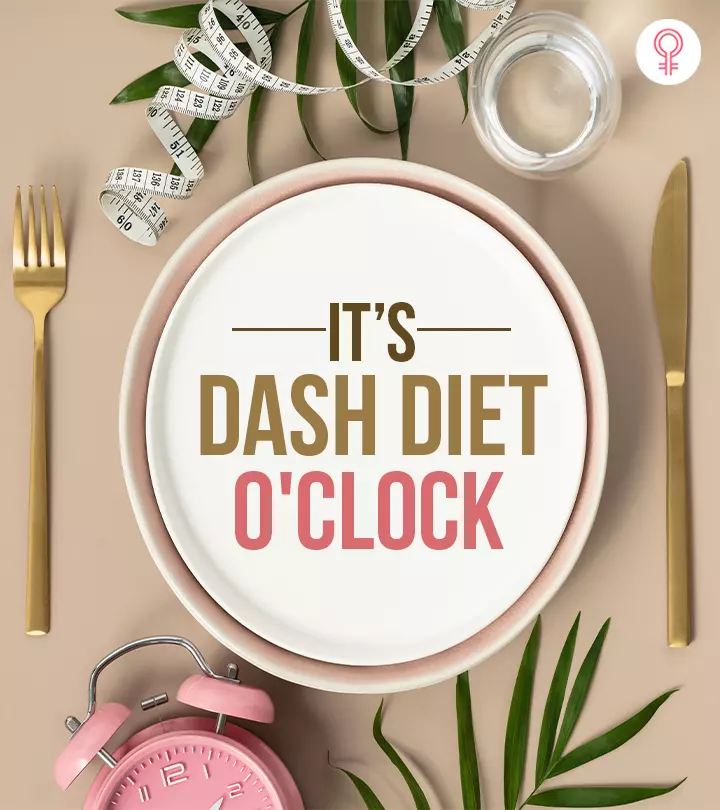




Community Experiences
Join the conversation and become a part of our empowering community! Share your stories, experiences, and insights to connect with other beauty, lifestyle, and health enthusiasts.